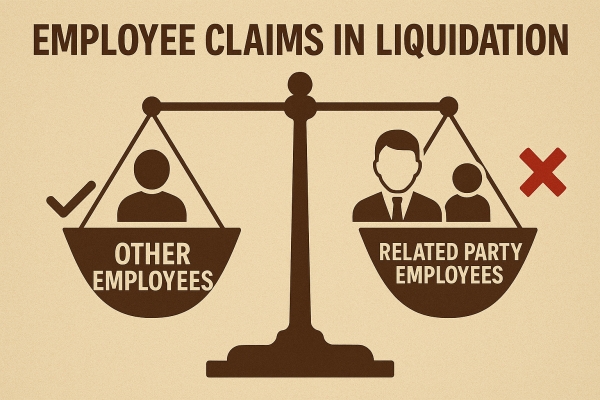Employee Claims in Liquidation: How are Related Party Employee Claims Treated?
When a company enters liquidation, one of the liquidator’s key responsibilities is to assess and distribute the company’s remaining assets to creditors in accordance with the Companies Act 1993. Among the creditors, employees are granted preferential status for outstanding wages, holiday pay and redundancy if they are entitled to it under their employment agreement.
The situation becomes more complex when the employee is related to a director of the company.
Normal Treatment of Employee Claims in Liquidation
Under Schedule 7 of the Companies Act 1993, employees are entitled to preferential claims for:
- Wages and salaries (including commissions and piecework) earned in the four months prior to liquidation.
- Holiday pay owed at the time of liquidation.
- Redundancy compensation (if contractually owed).
- Deductions made from wages for obligations like PAYE or child support.
These preferential claims are currently capped at $31,820 gross per employee as at October 2025 (this is adjusted by statute every three years). Any amounts above this cap, or claims not covered (bonuses, notice periods, wages outside the four-month time limit), are treated as unsecured claims and rank with the other unsecured creditors.
Related Employees: How Are They Treated Differently?
Under Schedule 7 of the Companies Act 1993 section 3 (4) (b) the definition of employee is defined as:
employee means any person of any age employed by an employer to do any work for hire or reward under a contract of service; but does not include a person who is, or was at any time during the 12 months before the commencement of the liquidation, a director of the company in liquidation, or a nominee or relative of, or a trustee for, a director of the company.
Under the act when an individual is owed money by the company for outstanding wages and holiday pay, if they are a relative of the director and have worked for the company in the 12 months prior to the commencement of the liquidation their claim in the liquidation will not be entitled to the preferential status granted to other employee claims.
What is a Relative?
The next aspect to look at is how a relative is defined, this is dealt with under section 2 of the Companies Act 1993 it sets out a relative as (adjusted for director):
- any parent, child, brother, or sister the director; or
- any spouse, civil union partner, or de facto partner of the director; or
- any parent, child, brother, or sister of a spouse, civil union partner, or de facto partner of the director; or
- a nominee or trustee for any of those persons
Key takeaway
If you are a director employing family members it is important to understand that their claims will not have any priority in a liquidation scenario, similarly those family members need to know that they will not be able to rely on receiving those funds in preference to other unsecured creditors and will rank with other trade creditors.
For non-related employees this provides reassurance that they will likely receive a larger distribution on their claim from the available assets as related claims are excluded making the total preferential creditor claim pool smaller.

